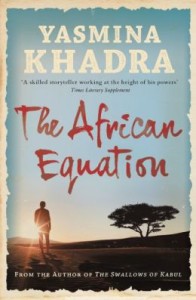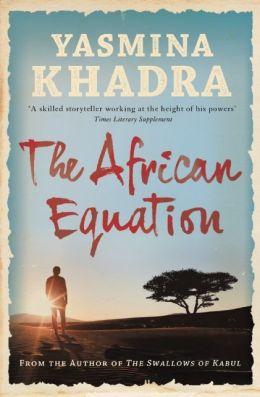
Here’s a story that could have been worked into a terrific novel in the hands of a writer with a trifle of self-restraint. Unfortunately, Yasmina Khadra, reputedly one of Africa’s greatest writers, displays none of that. Every one of his characters, from a German physician to a passel of Somali or Sudanese pirates, speaks like an Oxford philosophy don — and somehow they all understand one another perfectly without any indication that they could possibly speak any language in common. Khadra’s characters are not people but mouthpieces for his philosophical and political views, which tend to be tedious.
The novel’s protagonist, Kurt Krausmann, comes upon the dead body of his beloved wife soon after the tale opens. She clearly committed suicide. (This is not a murder mystery.) The good doctor, a general practitioner in Frankfurt, goes into an emotional tailspin. His best friend, Hans Makkenroth, one of Germany’s wealthiest and best-known industrialists, presses Krausmann to join him on a long ocean voyage on his yacht. Weeks underway, as Krausmann begins to recover his senses, Somali or Sudanese pirates (it’s never clear which) attack the ship in the Gulf of Aden and drag Krausmann and Makkenroth off to the Somali coast.
The African Equation by Yasmina Khadra ★★☆☆☆
There the group sets out on an overland journey westward for nearly 2,000 miles through Ethiopia and Sudan to the godforsaken reaches of Darfur, meeting violent and tragic circumstances along the way. The journey, while eventful, serves primarily as a setting for the principal characters — two of the pirates as well as Krausmann and Makkenroth — to pontificate about the meaning of life and about Africa and its relation to the West. While their sentiments are well expressed — remember, I compared these characters to Oxford philosophy dons — they strike me as dated and overwrought.
Think I’m exaggerating? Here’s a sample: “It is true that we are insignificant. But in this perfect body which age breaks down as the seasons pass and which the smallest germ can lay low, there is a magical territory where it is possible for us to take our lives back. It is in this hidden place that our true strength lies; in other words, our faith in what we believe to be good for us . . .” and that’s just the beginning of the soliloquy. Have you EVER heard anyone actually say anything like that?
By the way, Yasmina Khadra is not a woman as his pen name suggests but a former Algerian army officer named Mohammed Moulessehoul who adopted his wife’s name to avoid military censorship.
Africa has made worthy contributions to world literature through the work of an abundance of world-class writers: Chinua Achebe, Nadine Gordimer, Chimananda Ngozi Adichie, Wole Soyinka, NoViolet Bulawayo, and Alan Paton, among many others. Yasmina Khadra doesn’t measure up to them.
For more reading
See also 20 top books about Africa, including both fiction and nonfiction.
If your taste runs to genre fiction, check out my posts:
- Great sci-fi novels reviewed: my top 10
- My 20 favorite espionage novels
- 20 excellent standalone mysteries and thrillers
And you can always find my most popular reviews, and the most recent ones, plus a guide to this whole site, on the Home Page.



























Mal, I haven’t read this one and am sorry you didn’t like! Khadra’s The Attack, which I recommended to you in another comment, was on a smaller scale and better but had some of the same flaws. Hope it wasn’t my rec that steered you to a bad read – I owe you for so many great recommendations. (And I’m sure we’ll agree on Joseph Finder’s upcoming thriller The Fixer.)